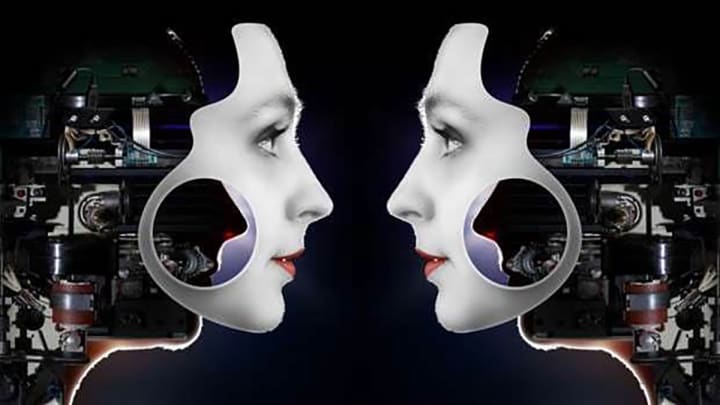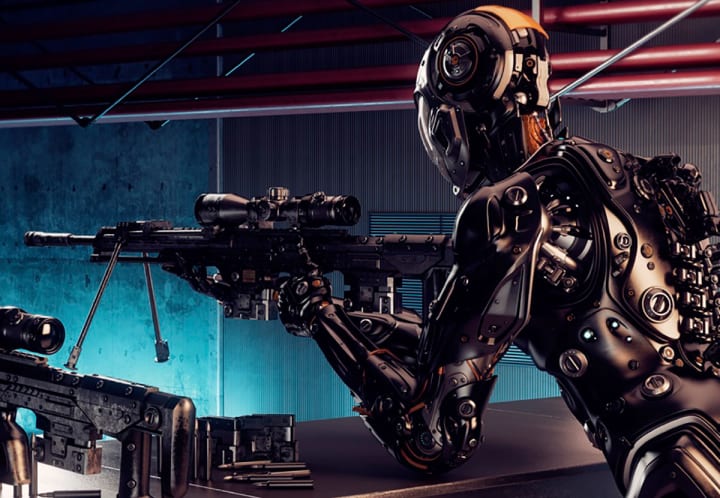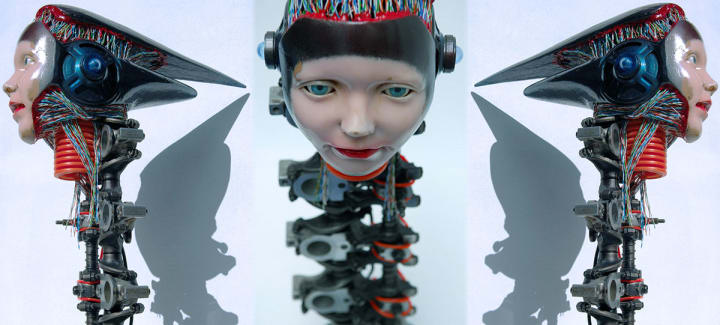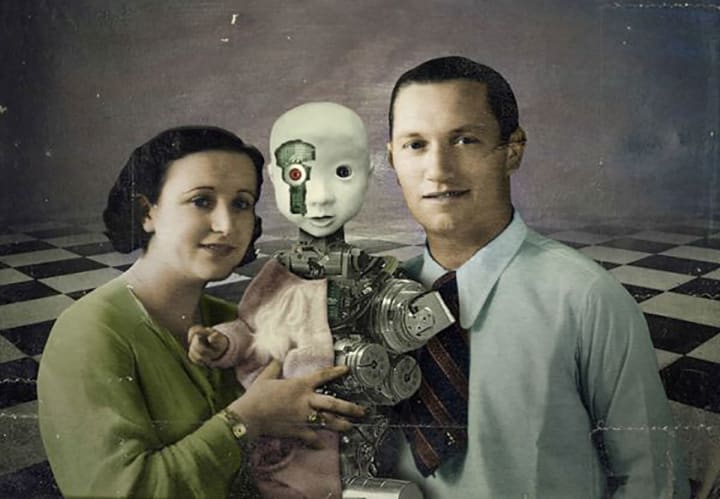Artificial Intelligence Research Today
Nearing a tipping point, artificial intelligence research today could unleash a world of morally ambiguous issues in the future.

We’ve all encountered artificial intelligence on the internet. Those AI programs are bots that are designed to mimic human behavior and make you feel more at ease with your decisions. As the programs became more advanced, it was shown that they could in fact influence your behavior. Artificial intelligence research today is nearing a tipping point that could unleash a world of morally ambiguous issues.
The Twitter war you had with that liberal pig or conservative nut job that never seemed to end. It never would end because you were likely speaking with a program whose sole purpose was to be defiantly defensive of its position forever. While you were smashing away on your keyboard in fits of existential rage, the likely cloud based software wasn't even getting a chuckle. The artificial intelligence used in these bots is simplistic in its directive, but can be extremely effective.
AI Twitter Bots

A study that was completed before the 2016 presidential election found that nearly 15 percent of the studied Twitter population were in fact bots. They are used by indeterminable, malevolent sources to build on each other and focus the conversation in a more desirable direction. Bots produced almost 20 percent of the conversation and the impact that may have had on the election is staggering. The study shows that both sides of the political landscape used bots to support their agenda. While these bots cannot yet directly impact policy, or vote for that matter, their impact on society cannot be ignored.
Propaganda has been used by governments since their conception in order to manipulate and control the proletariat. All means of communication have been used to rally support for whatever causes the government, monarchy, or dictator thought was prevalent. These bots are particularly effective, however, because of their ability to target specific demographics. The artificial intelligence analyzes all of the human intelligence we so willingly provide, to adjust the strategy it uses that has the highest probability of having the preferred result. The result being that one person in one battleground state changes their opinion, and the ripple effect that could influence the outcome of the most conflicted election in recent memory.
Artificial Intelligence Personality

Art by Hans Rudolf "Ruedi" Giger
With the artificial intelligence of bots and similar programs increasing at an alarming rate, the question might be, how good are they really at judging human personality? A Stanford study found that computers can judge personality traits better than people close to you. The computer used Facebook likes to match the subjects own scores of the five basic personality dimensions: openness, conscientiousness, extraversion, agreeableness, and neuroticism.
The Uncanny Valley (UV) hypothesis posits that the degree of human likeness of an agent has a complex relationship to the reaction of the humans to the agent. So, as artificial intelligence is better able to judge our personalities, the bots that we interact with on a daily basis will be better at manipulating us into behaving in a way that their programmer wants.
The internet is being catalogued all the time, partly by companies storing their user info, and also by our own hands when we store our information in cloud based software. A bot that has access to information about every click you make and word you type could direct you ever more accurately to the page that it wants you to see, and in a way that most affects your subconscious. If you are skeptical of this, think about the cereal you eat, the car you drive, and the phone you are likely reading this on. The advertisers know their audience and they directed their ads at you to subtly angle you toward their products. Think of that effect, times the 200 plus Facebook likes that each user, on average, makes.
AI Vetting Politicians

There has not been much empirical research regarding the personality traits of politicians. When given the Narcissistic Personality Inventory (NPI), along with some clergy and librarians, the politicians scored the highest in total narcissism. Without statistical significance this study is merely a suggestion, but one that few psychoanalysts would likely disagree with. That relentless self assurance is used to convince the American people that they are the best person for the job. It is inherently a destructive personality trait that all too often results in implosion. Artificial intelligence could be used in the vetting of presidential candidates. It could use all of their personal social media presence and any factual data imputed to decide if they are statistically fit for public office. In theory, proper testing of individuals in power could keep populations from making bad choices.
Military Artificial Intelligence

Artificial intelligence is becoming increasingly present in future plans. When armed with advanced weaponry and an upgraded AI, a drone that could be bought on Amazon becomes a deadly weapon. The Pentagon is spending billions to develop autonomous and semi autonomous weapons. One example is a missile that can decide its own target with pinpoint accuracy. It can go through a crowded room and kill only whom it has decided is the target. The fear, of course, is that the more autonomy we give these machines, the more chance we are taking that they drift from their core directives and kill an unintended target. This is something that has been explored in science-fiction for some time and is now reality. The Aegis warships can fire defensive missiles without human order. Israel and South Korea both have AI defense systems that are capable of killing targets a mile out. The letter presented by the International Joint Conference on Artificial Intelligence said it best. Members include Elon Musk, Stephen Hawking, and Steve Wozniak.
"Artificial Intelligence (AI) technology has reached a point where the deployments of such systems is practically if not legally feasible within years, not decades, and the stakes are high: autonomous weapons have been described as the third revolution in warfare, after gunpowder, and nuclear arms."
The US Army is developing robots that can navigate an environment when given a voice command. They are meant to act as teammates with the soldiers, and to keep human lives out of danger as much as possible. The robots all have memory, gathered and stored in a central unit. Cognition will come about once the algorithms for perception and long term memory are perfected. The Army's own website states that they are using psychological theory to augment the robots in areas such as learning and memory. The US Army Research Laboratory Human Research and Engineering Directorate (HRED) are attempting to mimic the way humans use memories to problem solve and develop those methods into algorithms for an autonomous system. This isn't just happening in the US. The Japanese are attempting to humanize robots. Humans react less harshly to robots that resemble humans. Japanese engineers aren't as focused on military use but they have developed very sophisticated robots that are able to accomplish human-like tasks. Artificial intelligence isn't inherently inimical to mortal life, it is the purpose humans give AI that creates the danger.
Technological Singularity

Art by Dominic Elvin
The technological singularity (or just singularity) is the hypotheses that the invention of artificial super intelligence will abruptly trigger runaway technological growth, resulting in unfathomable changes to human civilization. This really isn't hypothetical as the current math correlated to pace of technology creates a very clear path to incredible exponential growth.
By 2045 a computer with artificial intelligence will improve itself to the point of becoming a super intelligence and initiate a new era. This is becoming less science fiction and more science inevitability. Moore's Law is named after Intel co-founder Gordon Moore. The law originally stated that the number of transistors per square inch on integrated circuits would double every year since their invention. When these limitations are inevitably overcome, computers will have the processing ability more akin to the human brain which is approximately 10,000 trillion cycles per second. Engineer Peter Diamandis believes that by the year 2025, we will have a $1,000 dollar computer that can process at the speed of human brain.
Zoltan Istvan, a transhumanism activist, believes the eventual problem is, when the machine realizes it can do anything and grow in terms of speed, capacity, and memory, it might learn to deceive us very quickly as well.
Medical Artificial Intelligence

There is another side to artificial intelligence that could mean great things for quality of life. Medicine has made fantastic advancements in the last 100 years. The medical community is divided regarding the use of AI in hospital systems. The Department of Medicine at Cedars-Sinai Medical Center has a research program called AIM (Artificial Intelligence in Medicine) that is working to apply AI techniques to increase our understanding of the body. AI systems can work objectively and without variability. The AIM algorithms are used to take the raw digital data and make images of parts that the surgeon wouldn't be able to see. It takes images and can evaluate them and offer objective information to the physician. Lastly, it can also adjust itself when new information is given. This update aspect is important because it can detect minor changes that may have otherwise been missed.
Artificial Intelligence and the Government

The government has acknowledged the influence of artificial intelligence. President Obama's Precision Medicine Initiative and the Cancer Moonshot will rely on artificial intelligence to find data to help in diagnosis and treatment of cancer and other life-threatening illnesses. In 2016 the Federal government created the National Science and Technology Council sub-committee on machine Learning and Artificial Intelligence. It is designed to monitor the advances in AI but also coordinate how to use the science in government services more effectively. It is a challenge for any breakthrough in medicine to be deployed and become commonplace. There isn't an efficient system for new algorithms to be included in hospital systems. Hospitals tend to prioritize the money and if an algorithm won't greatly increase revenue, they are less likely to apply it.
Japan is also applying 10 billion yen to the science ministry. There is a focus there in the medical industry, diagnosing of symptoms and finding optimal treatments. Imagine a world where machines could analyze themselves and either fix what is wrong, or alert someone before it breaks completely. We can avoid having entire systems down in a crisis. Twenty firms and research institutions in Japan, including Toyota, NEC, and the government itself, are backing the RIKEN research Institute. Many of these groups believe that we are within striking distance of the tipping point and that AI itself is now not only inevitable but may be the only solution to the chaos that will inevitably follow its own birth.
About the Creator
Lindsie Polhemus
Lover of dogs, wine, and buffalo chicken. Laughing through this thing called life.






Comments
There are no comments for this story
Be the first to respond and start the conversation.